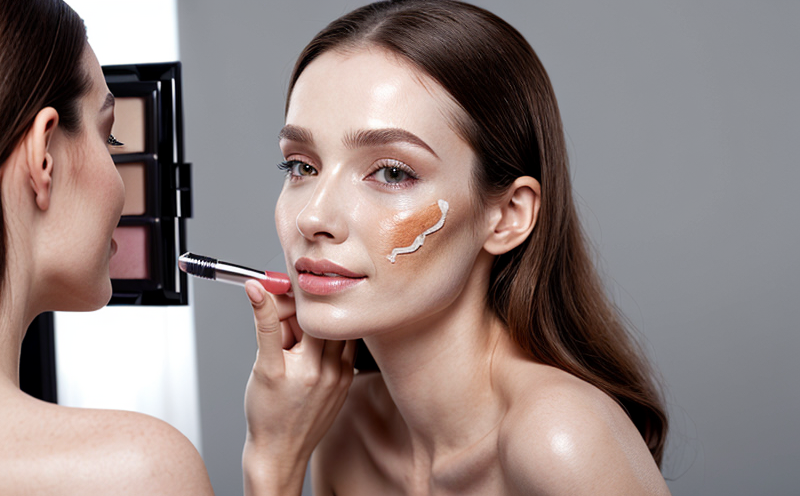Dermatological & Clinical Efficacy of Cosmetics
The dermatological and clinical efficacy testing of cosmetics is a critical process that ensures consumer safety, product quality, and compliance with international standards. This service focuses on evaluating the potential irritation, sensitization, and overall performance of cosmetic products to ensure they meet stringent regulatory requirements.
In today's competitive market, consumers are increasingly concerned about not only the effectiveness but also the safety of the cosmetics they use. Regulatory bodies like the European Union (EU) and the U.S. Food and Drug Administration (FDA) have established strict guidelines for cosmetics testing, emphasizing both dermatological and clinical efficacy.
Dermatological testing evaluates a cosmetic product’s potential to cause skin irritation or sensitization upon contact with human skin. Clinical efficacy testing assesses the product's performance in achieving its intended effects on the skin or hair. These tests are essential to ensure that products meet the highest standards of safety and effectiveness, thereby safeguarding consumers' health and enhancing brand reputation.
The process typically involves a series of pre-clinical assessments followed by clinical trials. Pre-clinical assessments may include in vitro methods such as patch tests or irritation potential testing using standardized media like EpiDerm or RESS. Clinical trials are conducted on human subjects under controlled conditions to observe the product's effects over time.
The methodology for these tests is rigorous and follows international standards, ensuring consistency and reliability across different laboratories. For instance, ISO 10993-11 provides guidelines for dermal irritation testing, while ISO 15129 offers criteria for skin sensitization tests. These standards are widely recognized and adopted by regulatory bodies worldwide.
Our laboratory adheres strictly to these international standards to provide accurate and reliable test results. Our team of experts ensures that every step of the process is meticulously followed, from specimen preparation to data analysis. This commitment to quality guarantees that our clients receive trustworthy results they can rely on for decision-making.
The importance of dermatological and clinical efficacy testing cannot be overstated. Not only does it protect consumers by ensuring product safety, but it also enhances brand credibility and trust in the market. By adhering to these rigorous tests, companies can launch products with confidence, knowing that they meet or exceed regulatory requirements.
Why It Matters
The importance of dermatological and clinical efficacy testing cannot be understated. These tests are not just a formality; they play a crucial role in ensuring the safety and effectiveness of cosmetic products. Regulatory compliance is paramount, as non-compliance can lead to product recalls, legal issues, and damaged brand reputation.
- Consumer Safety: Ensuring that cosmetics do not cause skin irritation or sensitization is critical for consumer safety. Non-compliant products could result in adverse reactions, which can be both harmful and costly.
- Regulatory Compliance: Regulatory bodies like the EU and FDA require strict adherence to testing protocols. Failure to comply can lead to product bans and recalls, impacting business operations significantly.
- Brand Reputation: A safe and effective product enhances brand credibility, fostering trust among consumers. This trust is essential for long-term success in the competitive cosmetics market.
- Market Entry: Meeting regulatory standards opens doors to international markets where stringent testing protocols are enforced.
In summary, dermatological and clinical efficacy testing is not just about meeting regulations but also about safeguarding consumer health, protecting brand reputation, ensuring compliance, and facilitating market entry. These tests ensure that cosmetic products not only perform as intended but do so safely and effectively.
Scope and Methodology
The scope of dermatological and clinical efficacy testing is comprehensive, covering a wide range of parameters to assess the safety and effectiveness of cosmetic products. This section outlines the specific tests conducted under this service.
- Dermal Irritation Testing: This involves assessing the potential for skin irritation by applying the product to human or animal skin. The EU uses in vivo methods, while alternative approaches like RESS are increasingly adopted for ethical reasons.
- Skin Sensitization Testing: This evaluates a cosmetic's potential to cause allergic reactions. Methods include in vitro tests using cell lines and in vivo patch testing on animals or humans.
- Clinical Efficacy Testing: These trials assess the product’s effectiveness in achieving its intended effects, such as moisturizing, anti-aging, or cleansing properties. They are conducted under controlled conditions to ensure accurate results.
The methodology for these tests is meticulously designed to adhere to international standards like ISO 10993 and ASTM D4060. Our laboratory uses state-of-the-art equipment and follows strict protocols to ensure the reliability of test results. Pre-clinical assessments are complemented by clinical trials, providing a holistic approach to product evaluation.
For dermal irritation testing, we use standardized methods such as the EU's RESS (Reconstructed Human Skin) or EpiDerm, which simulate human skin conditions accurately. For sensitization tests, in vitro methods like the Buehler test are employed for their ethical and reproducible nature. Clinical trials involve recruiting volunteers to apply the product under controlled conditions over a specified period.
Data analysis is conducted using advanced statistical methods to ensure accurate interpretation of results. Our team of experts ensures that every aspect of the testing process is followed rigorously, from specimen preparation to final reporting. This commitment to quality guarantees reliable and actionable insights for our clients.





